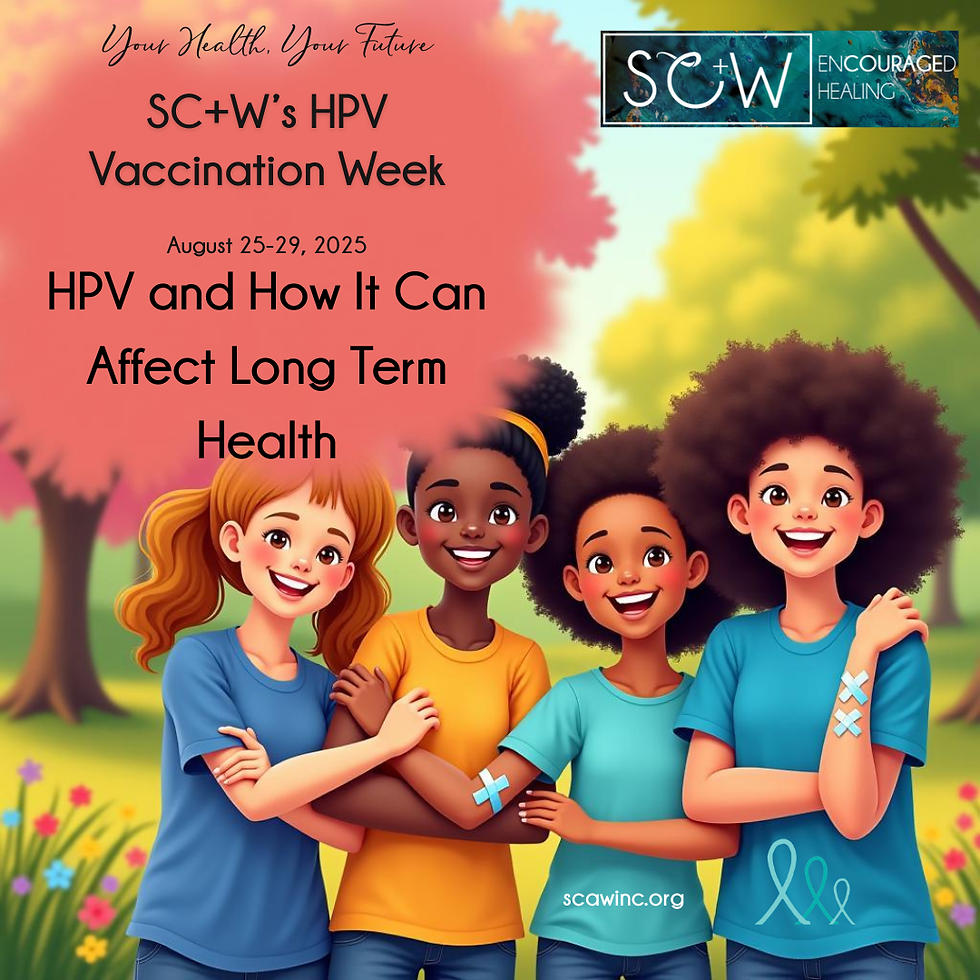SC+W’s HPV Vaccination Education Week! (Aug 25-29)
- niabaker3
- Aug 25, 2025
- 2 min read
Updated: Aug 30, 2025

Let's talk about HPV. You've probably heard the term before, whether it be from a doctor's visit or even a quick headline online- but what do you really know about HPV?
Did you know that nearly everyone will be exposed to HPV at some point in their lives? Despite how common it is, HPV is surrounded by stigma and misinformation but it doesn't have to be complicated!
Together this week, we'll break down the facts, clear up the myths, and highlight what you can do to stay informed and protected!
Follow us and don’t forget to share! You never know who could use this information.

What is HPV? How Does It Spread?
HPV, or Human Papillomavirus, is something many people will come across in their lifetime, even if they never realize it. It’s spread through simple skin-to-skin contact, most often in intimate moments, and it can pass between people whether there are symptoms or not. Because there are so many different types of HPV, everyone’s experience with it can be different—sometimes it clears on its own, and other times it may show up in ways that need more care. What’s most important to remember is that HPV is common, and having questions or concerns about it is completely normal.

HPV and How It Can Affect Long Term Health
While many types of HPV clear up on their own, some can stay in the body longer and cause changes that may lead to more serious health issues. Certain high-risk strains of HPV are linked to cancers such as cervical cancer, throat cancer, anal cancer, and others. Cervical cancer is the most well-known connection, since HPV can cause changes in the cells of the cervix over time. In other cases, HPV can affect areas like the mouth and throat, leading to cancers that might not show symptoms right away. Having HPV doesn’t mean someone will develop cancer, but understanding this link helps highlight why regular screenings—like Pap tests and HPV tests—and open conversations with healthcare providers are so important. With awareness and care, these risks can often be managed before they become more serious.
Taking care of your health
One of the most effective ways to protect against HPV and the health issues it can cause is through vaccination. The HPV vaccine is designed to prevent infection from the types of HPV most often linked to cancers and genital warts. According to the CDC, the vaccine can prevent more than 90% of HPV-related cancers when given at the recommended ages. It’s most effective when received before someone is exposed to the virus, but people can benefit from it even later in life. Choosing vaccination is a powerful step in reducing risk and supporting long-term health.
Learning about HPV can feel like a lot, but knowing the facts helps build confidence and ease. HPV is common, and there are real steps people can take to protect themselves and others—whether through vaccines, screenings, or simply staying informed. At the heart of it all, conversations about HPV are about care, prevention, and empowerment. No one is alone in this, and taking small steps today can create peace of mind for the future.



Comments